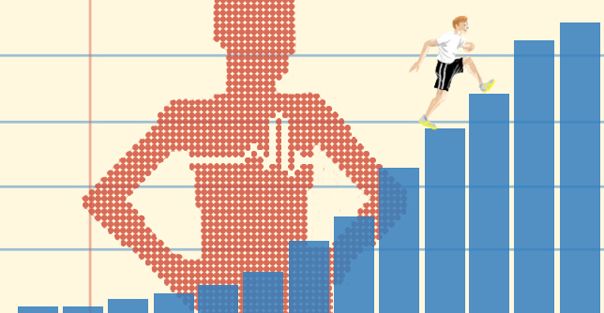Happiness
Un-Track Yourself
What we're losing when we're quantifying everything
Posted January 22, 2015

Put the body-monitoring tool down, turn around, and slowly walk away. Just because something is measurable doesn’t mean you should measure it, especially if there’s no guarantee it will improve your quality of life.
I’m not a technophobe—far from it. These days, I juggle many professional balls, so I gladly rely on my arsenal of technology almost as much as I depend on food, water, and air. The world has changed, the means by which we communicate have advanced, and there’s nothing I can do to change that—nor would I want to.
But just as there’s an app for everything, there’s also an emerging trend of shiny, new tools that can track our fitness, productivity, health, and even happiness. It’s all part of the Quantified Self (QS) movement, which posits that we can live better through tracking and analyzing data about ourselves.
Data love
Those of us in the business world have been conditioned and encouraged to think in quantitative terms. “What are the numbers? What are the metrics? What’s the bottom line?” This makes sense: How can we know if a product or service is producing a profit, capturing market share, or qualifies as a success story without numbers to capture progress or signal failure?
And so we crunch numbers, fill spreadsheets, and choose a set of performance indicators. In the marketplace, you can only manage what you measure, or so the maxim goes. And the marketplace has long expanded into our personal lives. This is why the QS movement is becoming popular; it’s an enticing proposition to know that you can now learn formerly unknowable things about how you work, sleep, and exercise by affixing a tool to your body and hitting the power button.
Mood sensors, happiness meters, and socio-metric analyzers like Meeting Mediator that monitor social dynamics in meetings have arrived in the workplace and enhance our desire for perfecting our performance. We have even begun to delegate the most intimate aspects of our lives to data-tracking services: from flirting to dating to break-ups—there’s an app for it. There’s even one for recording (and enhancing) our performance in bed (aptly called “Spreadsheets”).
Smaller lives
While the ambitions of the QS movement are impressive, I want to caution us not to place too much focus on measuring multiple aspects of ourselves to achieve an unreachable nirvana of human optimization. We are not robots, and neither are we a problem seeking a solution. There is much more to the human experience than how our bodies perform and how we handle tasks at work.
We are greater than the sum of all our data. We have emotions, seek to fulfill our curiosity, look for diversion, and possess big dreams. All these elements imbue us with our very human, and I would argue, our immeasurably romantic traits that we carry with us into failures and triumphs. It’s this part of ourselves that we draw on—and replenish—when we have the serendipitous encounters and moments of enchantment that allow us to feel truly alive. But when we tip the scales of balance by adopting a strict regimen of data tracking in a never-ending quest for self-improvement, we turn inward, leaving ourselves less open to the people and opportunities that give our existence its sharper edges.
Big data is making our lives smaller. The more data points at our disposal, the less we often know. More numbers don’t necessarily lift us from a state of dissatisfaction to one of cheerful fulfillment. That last part is up to us.
Tools to prove you are alive, but not to make you feel more alive
Only the examined life is worth living, the ancient Greek philosopher Socrates famously remarked, but it is important to remember that we can examine it without quantifying it. In business and beyond, we can manage what we can’t measure, and in fact we do it every day.
To claim a life worth living, I recommend unplugging from your tools and your carefully cultivated matrix of data. Instead of tracking how many calories you torched during a workout, concentrate on the movements you make, what burns, and what doesn’t—are you able to get out of your head and let go of earlier stresses? To be truly open and present for moments that will bring you what tools can’t track—joy, laughter, happiness, wonder, and love—it is necessary to be attuned to the world around you. What will make you feel more satisfied? Six-months of sleep data, or a belly laugh with a co-worker?
Monitoring tools will prove you are alive, but they won’t make you feel more alive. You may have a healthy blood pressure reading, find that you are happiest in early Friday morning meetings, or discover that your nightly sleep stats are to be admired and envied. But none of that data will make you more fulfilled for long—it just makes you more knowledgeable. You will maximize and optimize but lose the romance of getting to know.
The quest for a contented life does not conclude with a month’s or year’s worth of data and a series of impressive graphs. It requires paying heed to your humanity, and mine. It involves the labor of love, working with no certain outcome, the thrill of not knowing what’s going to happen the next day at work. It means performing in a slightly new role every day and trying yourself out in one lifelong leap of faith. It requires looking up from your gadgets to observe the world around you with fresh eyes.
There is no app for that.
To learn more, please see my new book THE BUSINESS ROMANTIC (HarperCollins).




